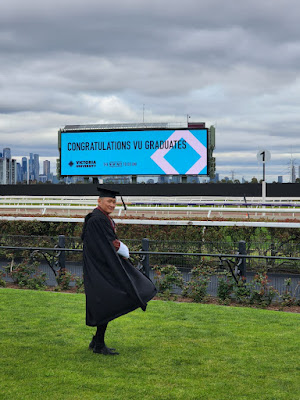Permanent Residency (PR) in Australia is an immigration status granted to individuals who are not citizens but have the right to live, work, and study in the country indefinitely. PR holders enjoy many of the same benefits as citizens, including access to Medicare (the public healthcare system), social services, and the ability to sponsor eligible family members for visas. Although PR status allows for indefinite stay, the accompanying travel facility is valid for five years and must be renewed if the individual wishes to travel internationally and return to Australia.
The Plan
By February 2022, I had crossed an important threshold: the completion of my Master’s degree from Victoria University. It was more than just a personal achievement - it symbolized the culmination of years of effort, displacement, and determination. With academic obligations fulfilled, I became eligible for the Temporary Graduate Visa (Subclass 485), a Temporary Resident (TR) visa designed not just to extend a stay but to bridge ambition with opportunity.
Time was tight. On March 1, I lodged my visa application through a migration agent - just two weeks before my Student Visa would expire on March 15. What followed was a waiting game, drawn out over nearly five months, filled with the silent weight of uncertainty and quiet optimism.
Then in August 2022, the visa was finally granted. What made it especially meaningful was an unexpected development: an extra year was added, giving me three full years of temporary residency - until August 2025.
That extension was more than just a timeline; it was a lifeline. But it also came with a pressing question that wouldn’t let go: What would I do after that?
Then What?
Three years in Australia. It sounded generous - on paper. But time, when not anchored by purpose, slips away quietly. I asked myself the harder questions: Was this just a pause before heading back to Bhutan? A place where job prospects were thin, where professional continuity was uncertain, and where reintegration would be less a return and more a retreat.
I had invested deeply - financially, emotionally, and professionally. Was I willing to treat these years as a transient phase, letting my savings trickle away while waiting for clarity that might never come?
Returning to Bhutan without a career roadmap would not only be disheartening - it would be professionally disqualifying. Education is a field that thrives on continuity and relevance. A three-year professional gap could prove detrimental. Worse, it would feel like I had walked a long way only to arrive back at the starting line, winded and disoriented.
But beyond career concerns, a deeper dilemma loomed: What values would I be modeling to my children if I chose comfort over courage? The decision wasn’t just about stability - it was about legacy. Something had to change.
And then the answer arrived. Quietly. Almost unexpectedly.
 |

No comments:
Post a Comment